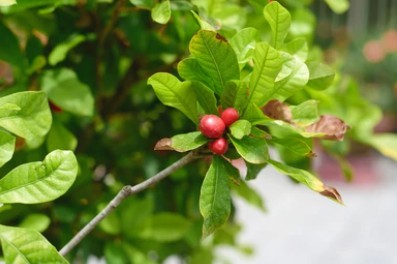
Miraculin is a homodimeric sweet taste modifying protein extracted from the fruit of the West African plant Synsepalum dulcificum. First sequenced in 1989, miraculin is a 24,600 Da sweet protein consisting of 191 amino acids and 13.9% by weight of various sugars. The native state of miraculin is a tetramer consisting of two dimers, each held together by a disulfide bond. The tetrameric miraculin in the crude state and the native dimer miraculin have taste-modulating activities that transform sourness into sweetness. Based on this characteristic, more and more scholars try to transfer the miraculin gene into plants to develop transgenic plants with excellent properties.
As a professional plant biology service CRO, Lifeasible is a pioneer in developing genetically modified plants. We have an advanced gene editing technology platform and experienced staff. We are committed to providing you with the most comprehensive miraculin transgenic plant development services.
Plant genetic transformation can be achieved using various methods, but the most common method is Agrobacterium-mediated transformation. In this service, our lab personnel place a synthetic gene encoding miraculin under the control of a constitutive promoter and introduce the miraculin gene into target plants. Then we will use techniques such as PCR to verify whether the miraculin gene is correctly introduced into the plant genome and whether the miraculin sweet protein is expressed. Lastly, sensory experiments will determine if the transgenic plants are sweeter.
| Service Step | Service Content |
| Synthesis of miraculin cDNA and vector construction | Customers can provide sequences and entrust our company to carry out gene synthesis. It can also provide constructed plasmids or Agrobacterium strains. |
| Target plant genetic transformation | Infection of T0 generation plants: Agrobacterium-mediated method was used to infect the target plant calli, and the transgenic miraculin plants were screened for resistance. Regeneration of T0 generation plants: Differentiate and culture the resistant plant callus, and transfer it to the medium to take root. |
| PCR identification of T0 generation plants | Extract plant genomic DNA and use specific primers to confirm the presence of the miraculin gene in transgenic plants. Move the positive plants to the culture soil. |
| Biological detection or trait analysis of T0 regenerated plants (optional) | Our analysis services are tailored to meet your needs, including southern hybridization analysis, northern hybridization analysis, preparation of anti-miraculin antibodies, purification of miraculin from transgenic plants, western blots, enzyme-linked immunosorbent assays (ELISA), analyses of recombinant miraculin for dimerization and N-glycosylation, taste modification analysis, etc. |
Note: Customers can specify plant varieties according to their needs or directly provide T1 generation seeds. Please contact our professional technicians directly for details.
Technical means: Agrobacterium-mediated transformation
Agrobacterium tumefaciens strains: GV2260, GV3101, AGL-1, EHA105, etc.
Vectors: E8-MIR-HSP, binary vector p35S-MIR-tHSP, plant transformation vector pBI121 (Clontech) and pBE2113-GUS, etc.
Plant types that can be transformed: tomato (Solanum lycopersicum), lettuce (Lactuca sativa), strawberry (Fragaria × ananassa), carrot (Daucus carota subsp. sativus), barley (Hordeum vulgare), canola (Brassica napus), etc.
Delivery results: at least 10 T0 positive miraculin transgenic plants, experimental data, and pictures, standard genetic transformation experiment report.

Lifeasible is committed to providing you with successful miraculin transgenic plant development services. We will develop a tailor-made solution for you to solve all the problems you encounter. Please contact us if you have any questions or need more information.
References
Lifeasible has established a one-stop service platform for plants. In addition to obtaining customized solutions for plant genetic engineering, customers can also conduct follow-up analysis and research on plants through our analysis platform. The analytical services we provide include but are not limited to the following:
Get Latest Lifeasible News and Updates Directly to Your Inbox
Adaptive Evolutionary Mechanism of Plants
February 28, 2025
Unraveling Cotton Development: Insights from Multi-Omics Studies
February 27, 2025